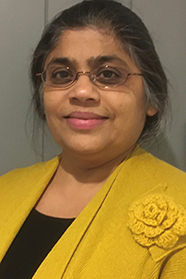
Contact Details
- Phone
- +64 3 479 7278
- sherly.parackal@otago.ac.nz
University Links
- Position
- Senior Research Fellow
- Qualifications
- BSc (Chemistry, Botany, Zoology), PG Dip (Food Science and Nutrition), MSc (Food Service Management and Dietetics), PG Dip (Nutritional Science), PhD (Nutritional Science)
- Research summary
- Diet-related non-communicable diseases in the Asia-Pacific region, migrant health, Asian health, ethnic-specific dietary assessment, community-centred intervention design, development and implementation (co-design)
- Memberships
- Global Diabetes Research Network for South Asians (Global DISHA) http://globaldisha.org/
- Otago Global Health Institute http://www.otago.ac.nz/global-health/people/index.html
- Public Health Association of New Zealand
- Fetal Alcohol Network New Zealand (FANNZ)
- Life member of the Indian Dietetic Association
Research
Sherly is the research lead in non-communicable diseases (Epidemiology and Prevention) at the Centre for International Health.
Sherly migrated to New Zealand from southern India in the mid-nineties. She is the Principal Investigator of the COVID-19 Diet and Activity study in Bandung, Indonesia, in collaboration with the Faculty of Medicine, Padjadjaran University, Bandung, Indonesia. Sherly is also initiating a diabetes prevention project in Indonesia.
Sherly is the Principal Investigator of the EMIGRATE project, investigating the health trajectory of ethnic voluntary migrants in Aotearoa, New Zealand and a key investigator in the Cancer Disparity Research led by Professor Rathan Subramaniam.
Projects
- A pilot trial of a co-designed, digitised health promoting intervention for New Zealand South Asians
- Co-creating educational comics and video clips for a health promoting dietary and activity programme targeting early South Asian migrants
- Co-designing a culturally appropriate intervention to prolong the Healthy Migrant Status of South Asians
- Development and piloting of a South Asian specific Food Frequency Questionnaire (SANZ FFQ) to investigate associations between their dietary patterns and health outcomes in New Zealand
- Easy As! Or Is It? Asian Migrants Navigating the New Zealand Health System
- Investigating dietary and activity changes due to the COVID-19 pandemic and its implications on health status of Adolescents and Adults in Bandung, Indonesia
- Unravelling the health journey of ethnic voluntary migrants in Aotearoa, New Zealand: Ethnic MIGRant heAlth TrajEctory (EMIGRATE) project
Diet, activity, and medicine usage in South Asians at risk for cardiovascular disease in Aotearoa New Zealand
Investigators and affiliations:
- Dr Sherly Parackal, Centre for International Heath, Division of Health Sciences, University of Otago
- Associate Professor Kirsten Coppell, Research Associate Professor, Department of Medicine University of Otago, Wellington
- Dr Mudassir Anwar, School of Pharmacy, University of Otago
- Dr Sumera Akhtar, Centre for International Heath, Division of Health Sciences, University of Otago
Funding: Otago Medical Research Foundation Laurenson Bequest Award
Abstract: Cardiovascular disease (CVD) is the most potent killer in New Zealand (NZ) with NZ South Asians (SA) being one of the three high risk groups. Nevertheless, targeted prevention measures for NZ SAs are glaringly negligible. Poor dietary habits and sedentary lifestyles are strongly associated with CVD as is poor medicine usage among SAs with diabetes, a risk factor for CVD. International research demonstrates the importance of first gaining an understanding of health beliefs, knowledge, and behaviours related to diet, physical activity, and medicine usage before designing ethnic-specific interventions to reduce CVD burden. We aim to gain this understanding for SAs in NZ, which is not known.
Diet and physical activity related health beliefs, knowledge and behaviour of South Asians with pharmacologically untreated hypercholesterolemia in Aotearoa New Zealand
Investigators and affiliations:
- Dr Sherly Parackal, Centre for International Heath, Division of Health Sciences, University of Otago
- Associate Professor Kirsten Coppell, Research Associate Professor, Department of Medicine University of Otago, Wellington
- Dr Sumera Akhtar, Centre for International Heath, Division of Health Sciences, University of Otago
Funding: Otago Medical Research Foundation Laurenson Bequest Award
Abstract: South Asians (SAs) have particularly high rates of Atherosclerotic Cardiovascular Diseases (ASCVD), such as coronary heart disease (CHD), stroke and peripheral arterial disease. NZ SAs are one of the three high risk groups for high blood cholesterol, a key risk factor of ASCVD, nevertheless targeted prevention measures are absent. Epidemiological investigations have identified a positive association between dietary saturated fats and the increased risk of ASCVD. Our recently completed study indicates that most participants treated for high blood cholesterol were diagnosed at a young age and were disheartened for not being able to manage the disease via lifestyle changes. What is unknown is whether SAs with medically untreated high blood cholesterol have the knowledge to make lifestyle changes and if they have received culturally appropriate professional advice to enable this. The current study aims to address this gap in our knowledge to inform clinical practice and develop an ethnic-specific intervention.
Student projects as primary supervisor
Co-designing a diabetes prevention program for urban communities in Bandung, Indonesia.
Candidate: Mrs Noormarina Indraswari
Degree: PhD
Postdoctoral supervision
Improving service delivery for NZ South Asian women with gestational diabetes in Aotearoa New Zealand.
Candidate: Dr Sumera Akhtar
Funding: HRC Career Development Award, 2024
Abstract: South Asian women are at high risk of developing gestational diabetes and are almost four times more likely than other New Zealand ethnicities. Women with gestational diabetes are seven times more likely to develop type 2 diabetes(T2DM) within five to ten years of an index pregnancy. Despite the higher rates of GDM among South Asians, there is a gap in our understanding of the lived experiences, knowledge and management of GDM, which would inform and improve GDM care for NZ South Asian women.
